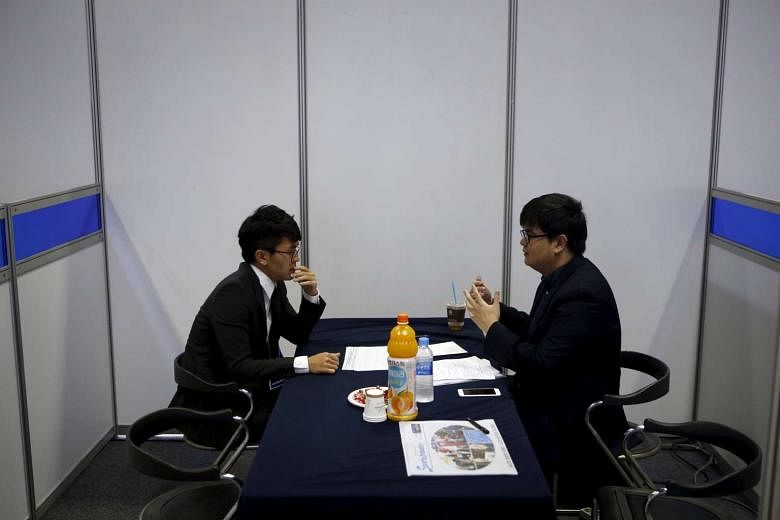With the youth unemployment rate in South Korea hitting a high of 10 per cent this year, young people are having such a hard time that they have coined a term online to describe their misery.
Welcome to "Hell Joseon", they say, a feudal society controlled by elites, where "commoners" like them live without hope. Joseon was the last dynasty in Korea whose reign ended in 1910.
"Everyone uses the term because they all feel it rings true. Even those with jobs have no hope," said Miss Cho En, 29, who has been freelancing in translating and writing since graduating with a degree in communications in 2010.
Youth unemployment is one of the biggest issues in South Korea, with many big companies cutting back on recruitment due to a sagging economy and a growing pool of fresh graduates vying for the same coveted positions.
More than 1.1 million young people are having particular difficulty finding jobs, and 32 per cent of those employed are holding non-regular jobs, according to data from the Ministry of Employment and Labour.
A labour reform drive is underway to overhaul the job market and seniority-based wage system.
President Park Geun Hye also started a youth employment fund in August, pledging 20 per cent of her monthly salary and an initial donation of 20 million won (S$24,400). Her effort drew a flurry of donations from other high-ranking officials including Prime Minister Hwang Kyo Ahn, as well as conglomerates, companies and banks.
What is known as the Youth Hope Fund, however, got nicknamed Youth Torture Fund by critics who slammed it as a public-relations stunt aimed more at showing off than solving the fundamental issue.
Local news reports noted that bank executives exerted pressure on all employees, even low-paid part-timers, to make contributions to the fund, likening it to the government "passing the buck" to the public.
Labour activists and unions also raised concern that companies would have less budget to spend on recruitment after making a donation to the fund, and that the government did not specify any spending plans even though the fund raised more than 1.9 billion won from about 50,000 people in just five days.
Yesterday, Mr Hwang, together with Labour Minister Lee Ki Kwon and Policy Coordinating Minister Choo Kyung Ho, announced at a press briefing that a foundation and, subsequently, an academy would be set up by the end of the year to manage the fund. About 4.3 billion won has been raised so far.
They said that the fund will be used to cover gaps in existing policies, while the academy will provide job information and training to young people and match them with potential employees.
The ministers did not give specific details though, causing some in the media to question how this will be different from existing job policies, and if the money - a small fraction of South Korea's annual budget of 2 trillion won for job creation for young people - would really make a difference.
"It's kind of naive to think that collecting a pile of money would be able to solve a huge structural problem," said Miss Cho.
The bigger problem, she believes, is the country's rigid top-down corporate culture that is suffocating young people with a lack of work-life balance, and limits on freedom of expression. She said her cousin, for instance, quit her job at a prominent tyre manufacturer as she could not stand the work culture there.


